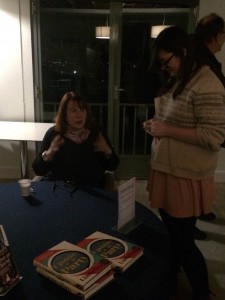Linda Grant was at the Creative Writing Reading Series on Wednesday to read from and talk about her latest book, Upstairs at the Party, a campus novel set in an new university in the early seventies – a university that, though unnamed, is clearly the University of York, where Grant herself went as an undergraduate in the early seventies – it was then, she said, eight years old, with only 2,700 students.
Though Grant dismissed the tendency of critics and interviewers to search for autobiography in her books – describing it as a ‘modernish idea about authenticity’, this novel, given its setting in time and place, clearly has a quasi-autobiographical setting, even if the events – leading up to, and then exploring the repercussions of, a tragic event that happens upstairs at a party – are not necessarily – though it seemed to me that they perhaps also were closer than Grant explicitly said. However, this seemed needful to Grant in this novel – which seemed to be focused around trying to understand her generation – and finding that to do so, she needed to go back, in her own words to the intimate place in people’s lives they return to, their formative influences’. She was interested, she said, in her generation’s idealism and what became of it – and the novel, and her thoughts on it, seem permeated with the ideologies of the early seventies.
She described this time, at first. as the dead period between the sixties and punk, but it soon became clear that to her, and for many, this was in intensely active time, a time of heated left wing politics among her generation – of feminism, Marxism, explorations of gender and sexual identities – a time when Peter Hitchens could be found on campus hectoring fellow students into taking the Marxist pamphlets he was handing out. Grant now, and in the novel, her narrator, maintains a skepticism towards the fervor of these ideologies – it is clear that this was a time of political experimentation with identity – which is perhaps why she describes it as dead – its experimentation and ardor being both something potentially damaging to individuals, and something that has had long term societal legacies. The age perhaps needed, she said, those that would experiment with and discover the boundaries of these ideologies and identities, and those who fall off the edge.
This, she said, was what differentiates her novel from other campus novels – it is the opposite to Brideshead, the novel, she said, that they were all reading at the time, because, at York, the halls of academe didn’t really exist: the students themselves were actively creating the mythology and themselves. York, she said, was fascinating, in its ideology that totalitarianism could be defeated by the amalgamation of arts and sciences in a collegiate system built from concrete and centered around a plastic-bottomed lake. There wasn’t, she said, really any pastoral care, its students were left to sink or swim on their own. And many of them sank.
Asked about the relation of her work to the historical novel – given that Upstairs at the Party is, like her other novels, set post World War II – that is to say in the relatively recent past, Grant replied that she is far more interested in in what she feels she thinks of as modern times – with WWII providing a cut off point – she wouldn’t she said, ever write a novel set during WWII, she’d find it too like dress up, but the legacy of that war, and post world war reconstruction is something that very clearly she thinks of as part of what h some to define modernity.
She was asked too, about likeable characters – citing Doris Lessing’s The Good Terrorist as an excellent example of a brilliant novel with no likeable characters. The popularity of the likeable character, of someone you can root for, she dismissed, saying the questions you should ask of your characters are: are they alive? are they interesting? is their monstrousness interesting? do you recognize their flaws/mistakes? If you want to make friends, she said, don’t go to fiction, go to a party.

